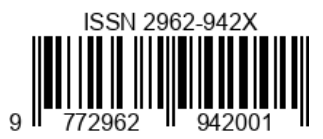Edukasi Scale-Up UMKM Dan Pemilihan Investasi Era Endemi Covid-19
DOI:
https://doi.org/10.55606/jpkm.v1i3.22Keywords:
Scale-up; Endemic Era; MSMEs; Investment SelectionAbstract
The COVID-19 pandemic has impacted all sectors of the Indonesian economy. Many MSME actors close their businesses because of the declining interest in buying people. This activity aims to provide helpful information so that MSME actors receive stimulus funds to re-run existing businesses. They conducted this activity online through a zoom meeting attended by MSME actors from various sectors. Therefore, providing recommendations for MSMEs to sell their products through e-commerce and promote them through digital marketing as a marketing strategy to survive the pandemic. In addition, MSMEs also need to optimize marketing relationships with customers through customer relationship marketing to create loyal customers. Loyal customers have the potential to make repeat purchases and recommend products to other potential customers. By implementing this strategy, it is hoped that MSME businesses can continue to survive and have a positive impact on society and the economy Empowerment of Waqf through the Agricultural Sector as an Effort for Family Economic Resilience
References
Atmaja, H. E., & Novitaningtyas, I. (2021). Analisis Aspek Pemasaran UMKM di Masa Resesi Global Dampak dari Pandemi Covid-19. Jurnal Ilmiah Poli Bisnis, 13(1), 1–11.
Azizah, F. N., Ilham, I. F., Aqidah, L. P., Firdaus, S. A., Astuti, S. A. D., & Buchori, I. (2020). Strategi UMKM untuk Meningkatkan Perekonomian Selama Pandemi Covid-19 Pada Saat New Normal. OECONOMICUS Journal of Economics, 5(1), 46–62.
Maulidizen, A. (2019). Economic Thought of Ibn Taimiyah and Relevance to the World Economic and Community Economic System. ESENSIA: Jurnal Ilmu-Ilmu Ushuluddin, 20(2), 131–146. https://doi.org/10.14421/esensia.v20i2.2103
___________, & Pratiwi, E. (2020). The Concept of Qat’I Dalalah: Definition, Laws and Perceived Conflict. Khatulistiwa: Journal of Islamic Studies, 10(1), 115–131.
___________, A., & Raihanah, A. (2019). The Technique of Determining Ijtihad and Its Application in Life: Analysis of Istihsan, Maslahah Mursalah, ’Urf and Syar’u Man Qablana. Al-Ahkam: Jurnal Ilmu Syariah Dan Hukum, 4(1), 45–62.
___________, A., & Sahida, A. (2019). An-Nahyu: Consept and Implementation in Islamic Law Determination. Khatulistiwa: Journal of Islamic Studies, 9(1), 116–140.
___________, A., Tirmidzi, M., & Rizapoor, H. (2021). Migration of Muslims to Other Parts of the World: New Events and Facts. Religia: Jurnal Ilmu-Ilmu Keislaman, 24(2), 141–156.
Natasya, V., & Hardiningsih, P. (2021). Kebijakan Pemerintah Sebagai Solusi Meningkatkan Pengembangan UMKM di Masa Pandemi. Ekonomis: Journal of Economics and Business, 5(1), 141–148.
Rosita, R. (2020). Pengaruh Pandemi Covid-19 Terhadap UMKM di Indonesia. Jurnal Lentera Bisnis, 9(2), 109–120.
Sutrisno, E. (2021). Strategi Pemulihan Ekonomi Pasca Pandemi Melalui Sektor UMKM dan Pariwisata. Jurnal Kajian Lembaga Ketahanan Nasional Republik Indonesia, 9(1), 641–660.
Thaha, A. F. (2020). Dampak COVID-19 Terhadap UMKM Di Indonesia. Brand: Jurnal Ilmiah Manajemen Pemasaran, 2(1), 147–153.







